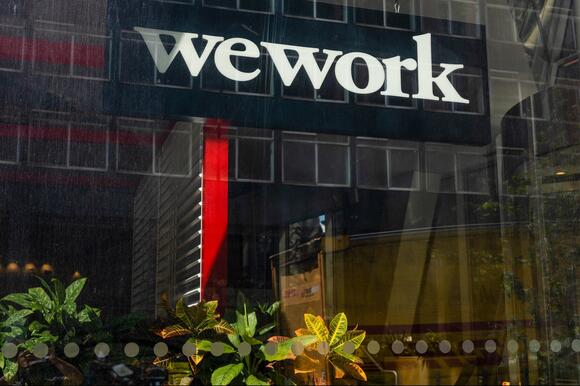
WeWork , the global co-working company, has issued a warning to investors about its potential inability to continue operating.
The company expressed "substantial doubt" regarding its status as a "going concern" in its Q2 earnings report released on Tuesday. The report stated concerns about the company's future viability due to losses, cash flow, and member losses — prompting the need for a plan to improve liquidity, profitability, and raise capital.
Once hailed for its charismatic founder Adam Neumann and predictions of exponential growth, WeWork was worth a staggering $47 billion at its peak in 2019, with 850 locations worldwide. Today, the company has 717 locations open or coming soon, according to the company's website .
WeWork's stock value is down by almost 90% year-to-date as of Wednesday morning.
A recent restructuring aimed to save the company by closing underperforming locations and reevaluating financials, but the sudden departure of CEO Sandeep Mathrani in June added to its challenges.
In 2019, a failed initial public offering nearly led to WeWork's collapse, but the company was salvaged by SoftBank, which shelled out a $1.5 billion investment in 2019 to be paid over the next year — in addition to $3 million in shares of other investors of WeWork. However, the company's fate was further hindered by Covid-19 as a global lockdown took hold, ultimately reporting $3.2 billion in losses over the course of the pandemic.
In another effort to save the company, in 2021, WeWork went public by merging with a special purpose acquisition company (a publicly traded entity formed to raise funds from investors and subsequently acquire or merge with a private company, facilitating its entry into the public market).
Related: WeWork Co-Founder Adam Neumann Wants to Be Your Landlord, Again
Despite some improvement in occupancy rates in 2022 , WeWork has continued to face significant cash burn. The company has lost $15 billion since 2017, per The New York Times , with SoftBank incurring over $10 billion in losses from its investments.
In the new report, the company stated that its survival depends on effectively implementing a management plan over the next year, taking actions such as reducing rent costs, boosting revenue by minimizing member turnover and increasing sales, managing expenses, and pursuing additional capital through debt/equity offerings or asset sales.
"The company's transformation continues at pace, with a laser focus on member retention and growth, doubling down on our real estate portfolio optimization efforts, and maintaining a disciplined approach to reducing operating costs," David Tolley, interim CEO, said in the report.
No comments:
Post a Comment